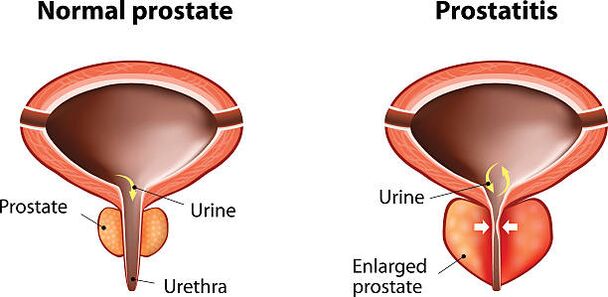Prostatitis is an inflammatory process that has developed in the tissues of the prostate gland, sometimes with a transition to the muscular part of this organ. This causes perinatal pain, weakness, fatigue, urinary dysfunction and sexual dysfunction. It is very important to treat acute prostatitis to avoid dangerous complications from this disease.

Currently, the causes and processes that occur in prostatitis are well understood. Therefore, urologists have many tools for the treatment of this disease. They can only be prescribed by specialists who have knowledge of the relevance in the development of diseases suffered by certain drugs, and also take into account the contraindications to them.
Antibacterial agents
The most common cause of prostatitis is bacteria. Antibacterial drugs are prescribed to fight it.
In order to carry out a targeted effect on the bacteria that cause prostatitis in a particular person, it is necessary to conduct a bacteriological study of the secretions secreted by the prostate. Only after knowing the name of the microorganism, its properties and what antibacterial agents are sensitive, you can choose an adequate antibiotic. And modern medicine with a similar orientation can cure severe forms of the disease. In acute bacterial prostatitis, the following antibiotics are used:
- Amoxicillin;
- Ceftriaxone;
- Cefotaxime;
- Ofloxacin;
- Ciprofloxacin;
- Azithromycin.
This is not a complete list of antibacterial drugs used in the treatment of prostatitis.
Antivirus treatment
If prostatitis has a herpetic etiology, it is treated with antiviral drugs. Ia:
- Acyclovir;
- Valciclovir;
- Ffamciclovir.
The latter drug is the "gold standard" for the treatment of viral prostatitis.
Non-steroidal anti-inflammatory drugs
Drugs such as Diclofenac, Indomethacin, Ketoprofen or Ketorolac are not needed to relieve the pain that accompanies the disease, but to reduce the swelling of the gland and its inflammation. They also contribute to the appearance of substances in the blood that facilitate the manifestation of poisoning and reduce the increased body temperature.
The optimal drug to fight inflammation is Diclofenac, it can also relieve pain syndrome. If the pain is very severe and sharp, Ketorolac is used.
Medicines that relieve cramps
In the treatment of prostatitis, drugs are used that act on various major points of pelvic and prostate muscle spasm. This allows you to urinate and helps the previous group of medications to relieve the pain. So, here they beg:
- Drotaverine: it acts on the smooth muscles, making it impossible in them the reaction, because muscle spasms occur;
- Baclofen: reduces the sensitivity of nerve fibers from the prostate and venomous organs;
- Tamsulosin: acts only on receptors found in the muscles of the bladder and prostate.
Side effects
Good supplements for the treatment of prostatitis are the following medications:
- Prostate extract: the drug protects prostate cells from damage during inflammation, improves microcirculation, relieves congestion in the small pelvic canal, and strengthens the ducts. All these effects are very beneficial for chronic prostatitis. Having animals, not of chemical origin, does not cause side effects. It can be used in the form of injections or suppositories.
- Oil palm fruit extract. It is an herbal medicine with a strong anti-inflammatory effect. It also regulates the amount and strength of urination, and reduces the unpleasant symptoms that occur when going to the toilet.
- Bioactive supplements, containing protein and nucleoprotein complexes isolated from the bovine prostate gland, which affect prostate metabolism, normalize its work and, therefore, urinate.
























